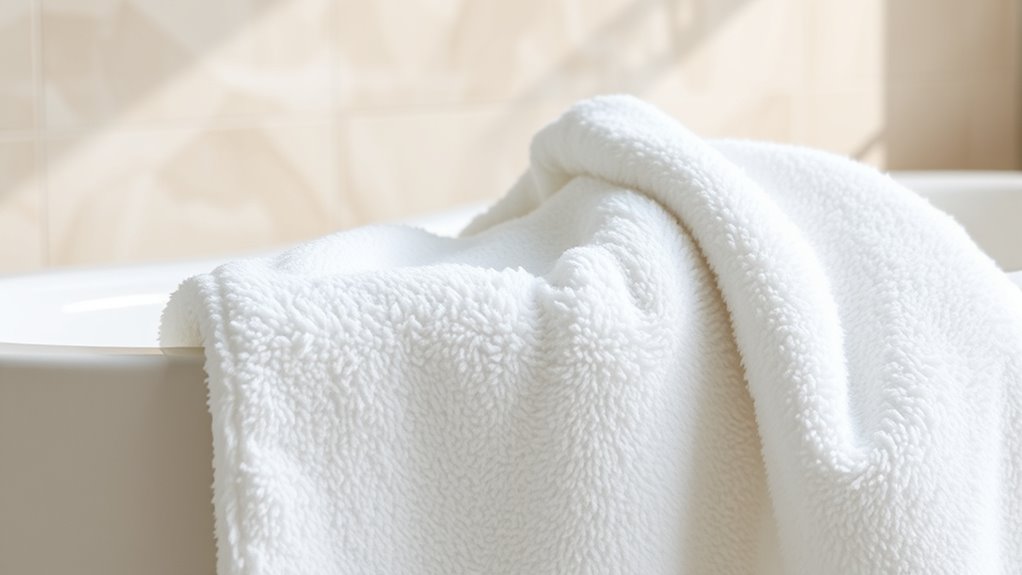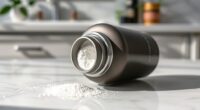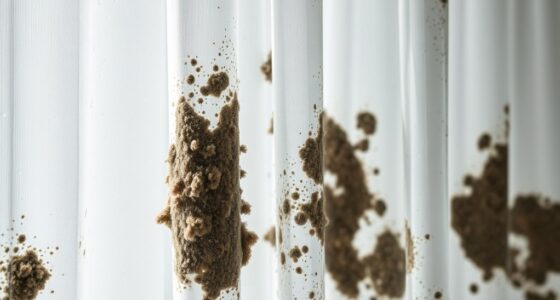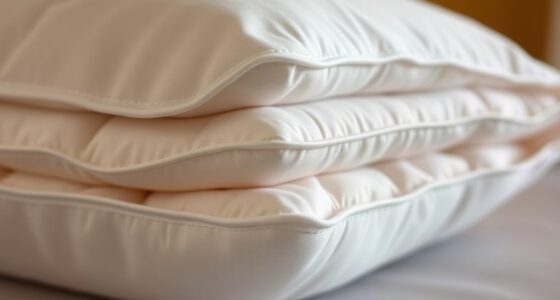Your bath towels become less fluffy over time because mineral deposits from hard water, soap residue, and buildup from detergents can stiffen fibers. Overloading your washer or drying towels on high heat can also damage their softness. To restore their plushness, try using vinegar and baking soda during washes, avoid fabric softeners, and dry on low heat or air dry. Keep caring for your towels well, and you’ll discover how to keep them soft longer.
Key Takeaways
- Mineral buildup from hard water causes towels to stiffen and lose fluffiness over time.
- Using excessive detergent or fabric softeners leaves residue that flattens fibers.
- High heat during drying damages fibers, reducing towel softness and plushness.
- Overloading the washer prevents thorough rinsing, trapping residue and minerals.
- Regularly using vinegar and gentle drying methods can restore and maintain towel fluffiness.
Common Causes of Towels Losing Their Fluffiness
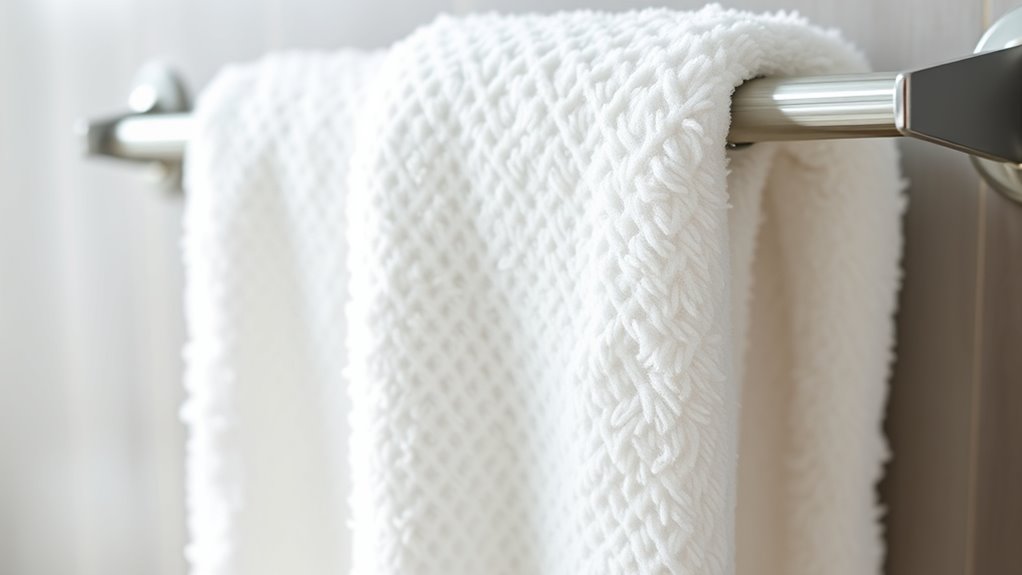
Over time, towels tend to lose their fluffiness mainly because of the buildup of soap residue and minerals from hard water. When you wash your towels without rinsing thoroughly, soap scum can cling to fibers, making them stiff and flat. Hard water contains minerals like calcium and magnesium, which settle into the fabric during washing, weighing down the fibers. These deposits block the towel’s natural loft, causing it to feel coarse instead of soft. Additionally, using too much detergent or fabric softeners can leave a film on the towel’s surface, further reducing fluffiness. Over time, this buildup accumulates, making your towels less plush and more rigid. Regularly cleaning your washing machine can help prevent mineral buildup and maintain towel softness. Using a water softener or descaler can also reduce mineral deposits, helping your towels stay fluffy longer. Incorporating proper washing techniques, such as avoiding overloading the machine and using the correct water temperature, can further improve towel fluffiness and overall softness. Proper drying methods, like avoiding excessive heat, can also help maintain the towels’ textural qualities and plushness. Addressing these causes helps restore your towels’ softness and maintain their fluffy feel.
The Impact of Washing and Drying Habits on Towel Texture
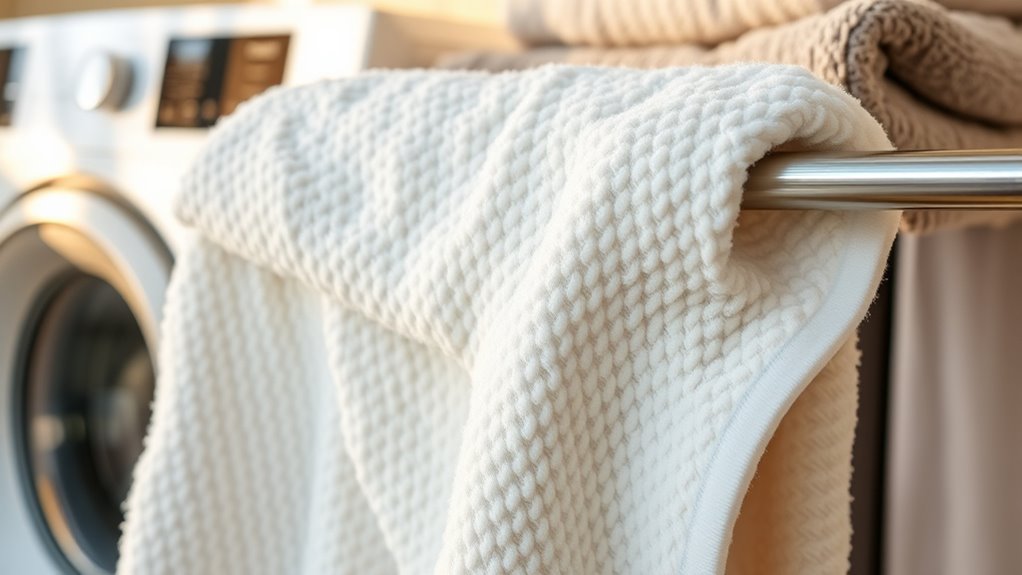
Your washing and drying routines directly influence how fluffy your towels stay over time. Using too much detergent can leave residue, making fibers stiff and flat. Overloading the washer prevents towels from rinsing thoroughly, trapping dirt and detergent. High heat during drying can damage fibers, reducing softness. Tumble drying on low heat helps maintain fluffiness, while air drying may take longer but preserves towel texture. To improve results, use a gentle cycle, avoid fabric softeners, and dry towels completely. Here’s how your habits impact towel quality:
| Washing Practice | Drying Method | Effect on Towels |
|---|---|---|
| Overloading washer | High heat drying | Dulls fibers, reduces fluffiness |
| Excess detergent | Tumble dry on low | Keeps towels soft and fluffy |
| Using fabric softener | Air drying | Maintains fiber integrity |
| Incomplete drying | Quick drying cycle | Causes stiffness, flattens fibers |
How Hard Water Affects Your Towels and What to Do About It
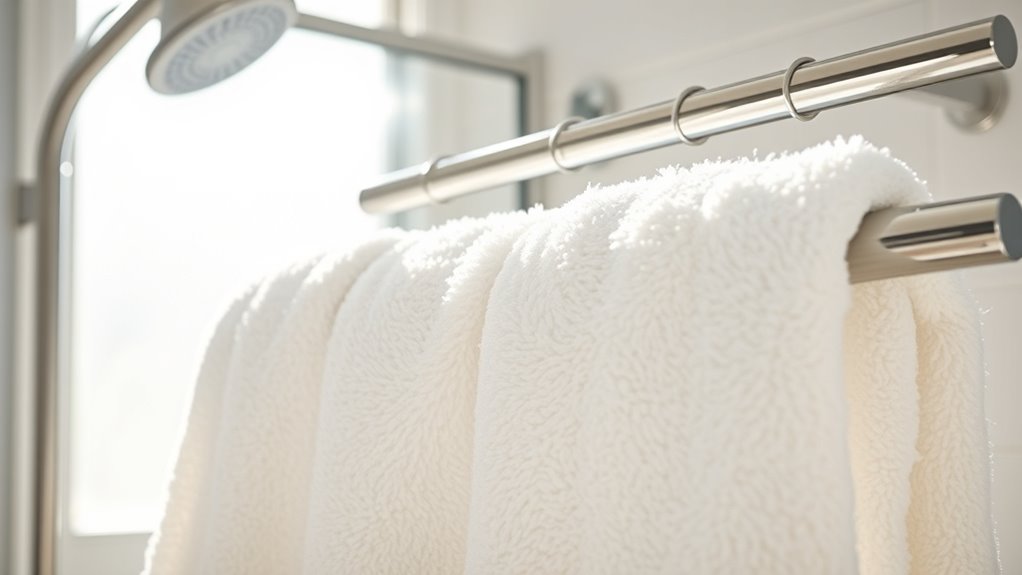
Hard water contains minerals like calcium and magnesium that can build up on towel fibers over time. This buildup makes your towels feel stiff, rough, and less absorbent. The minerals clog the tiny fibers, preventing them from fluffing up and soaking up water effectively. Over time, towels become dull and lose their softness. Using vintage decor inspired techniques, such as adding natural elements like linen and wood accents, can also help maintain towel quality by creating a more breathable environment that minimizes mineral buildup. Additionally, understanding water hardness levels can help you choose the most effective treatment options for your water supply. It is also helpful to recognize water purification methods, which can significantly reduce mineral content and improve towel softness. Regularly testing your water’s mineral levels ensures you can select the most appropriate treatment for your specific situation. To combat this, consider these solutions:
- Use a water softener or install a filtration system to reduce mineral content.
- Add half a cup of white vinegar to your laundry to neutralize mineral deposits.
- Wash towels separately from heavily soiled or mineral-rich fabrics to prevent buildup.
Addressing hard water issues helps restore your towels’ plushness and prolongs their lifespan. Proper care guarantees your towels stay soft and fluffy after every wash.
Simple Techniques to Restore Fluffiness to Your Towels
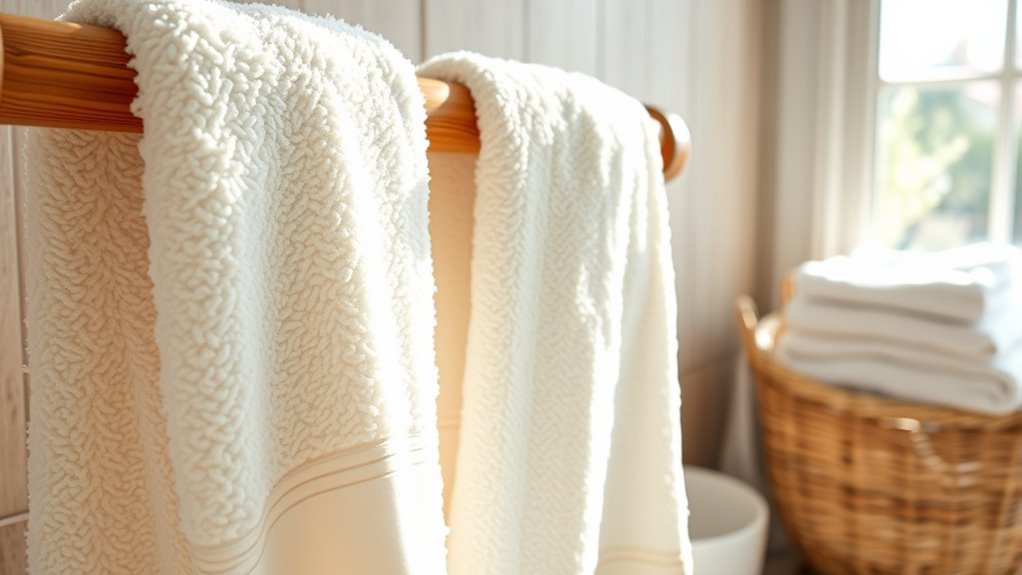
Once you’ve addressed mineral buildup from hard water, restoring your towels’ fluffiness is straightforward with simple techniques. Start by washing your towels with half a cup of baking soda to break down detergent residue and minerals. Avoid fabric softeners, which can weigh down fibers. Instead, add a cup of white vinegar during the rinse cycle to soften and restore absorbency. To boost fluffiness, tumble dry your towels on a low heat setting, adding clean tennis balls or dryer balls to fluff fibers. Incorporating proper laundry practices can further enhance your towels’ softness and longevity. Using natural fabric softeners like vinegar helps maintain fiber integrity and softness over time. Additionally, understanding fiber types can help select the best care methods for different towels. Recognizing water quality is another important factor, as mineral content can significantly impact towel softness. For example, hard water can cause mineral deposits that make towels stiff and rough. Here’s a quick overview:
| Technique | Benefit |
|---|---|
| Baking soda in wash | Removes residue, restores softness |
| Vinegar rinse | Softens fibers, improves absorption |
| Tumble drying with balls | Fluffs fibers, maintains plushness |
Preventative Tips for Keeping Towels Soft and Plush Longer
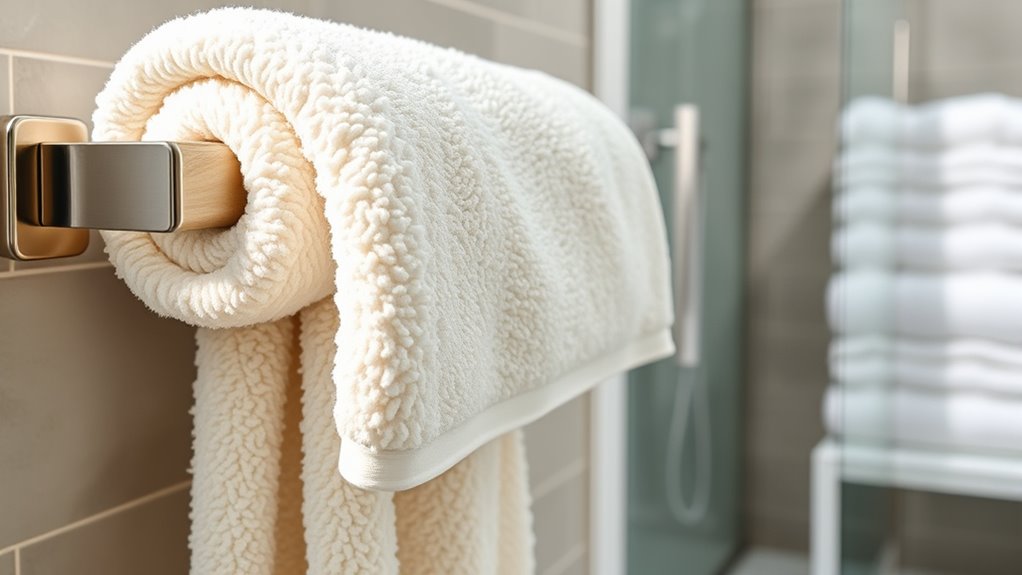
To keep towels soft and plush for as long as possible, adopting preventative habits is key. You can extend their fluffiness by making simple changes to your laundry routine. First, avoid overloading the washing machine, which prevents towels from being thoroughly rinsed and rinses out natural fibers. Second, skip fabric softeners—they can coat fibers and make towels stiff over time. Instead, use vinegar occasionally to help break down residue. Third, dry towels properly: tumble dry on low heat or hang them in a well-ventilated area. These habits help maintain the fibers’ integrity, preventing them from becoming coarse and flat. Additionally, choosing the right type of electric bike, such as those with higher horsepower (10 to 20 HP), can enhance your off-road adventures and ensure durability. Consistent care keeps your towels feeling fresh, fluffy, and inviting after every wash. Proper maintenance and gentle handling are essential for preserving the softness of your towels over time.
Frequently Asked Questions
Can Fabric Softeners Damage Towel Fibers Over Time?
Yes, fabric softeners can damage towel fibers over time. They build up a residue that coats the fibers, making your towels less absorbent and less fluffy. This coating can weaken the fibers, reducing their lifespan. To keep your towels soft and fluffy, avoid using fabric softeners regularly. Instead, opt for natural alternatives like white vinegar, which softens without causing damage and helps maintain the towel’s absorbency.
Does the Type of Detergent Affect Towel Fluffiness?
The type of detergent you use definitely impacts your towel fluffiness. Harsh or heavily scented detergents can leave residues that weigh down fibers, making towels less fluffy over time. Opt for a gentle, eco-friendly detergent without added whiteners or fabric softeners. Using a smaller amount and avoiding overdrying also helps maintain softness. Switch to a mild detergent, and you’ll notice your towels stay plush and fluffy longer.
How Often Should I Replace My Old Towels?
You should replace your old towels every 2 to 3 years. Over time, towels lose their absorbency and fluffiness, making them less effective and less comfortable. If your towels become frayed, stained, or retain odors despite washing, it’s time for new ones. Regularly upgrading your towels ensures you enjoy softness and absorbency, and it helps maintain good hygiene. Keep an eye on signs of wear to know when it’s time for a refresh.
Are There Specific Materials That Hold Their Fluff Longer?
It’s funny how you might notice certain towels stay fluffy longer, almost like they’re better at holding onto their softness. Generally, towels made from Egyptian or Turkish cotton tend to keep their fluff because of their long fibers. Microfiber towels also hold their plushness well, thanks to their dense weave. So, if you want your towels to stay cozy, choose high-quality cotton or microfiber options—they’re more likely to stay fluffy through many washes.
Can Using Vinegar Really Help Maintain Towel Softness?
Yes, using vinegar can really help maintain your towel softness. When you add a cup of white vinegar to your laundry, it works as a natural fabric softener and helps break down detergent residue that can make towels stiff. You should add it during the rinse cycle, not with detergent, to keep your towels fluffy and fresh. Vinegar is an affordable, effective way to preserve that plush, cozy feel you love.
Conclusion
Think of your towels like a favorite pillow—when neglected, they lose their fluff and comfort. I once ignored mine until I realized they felt more like sandpaper. Regular washing, avoiding hard water buildup, and proper drying can keep your towels soft and plush. By giving them the care they deserve, you’ll enjoy cozy, fluffy towels every time. Don’t let neglect turn your towel into a rough patch—treat them well, and they’ll stay inviting for years.
